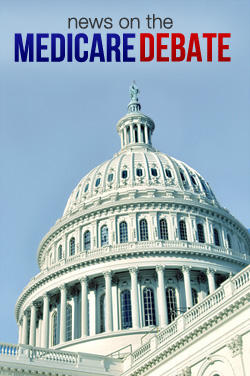
The Affordable Health Care Act in its present form will require most Americans to have health insurance by 2014.
Despite all the campaign rhetoric and borderline mudslinging we’ve seen pertaining to Medicare in recent months, it appears the major

political parties are more in agreement than disagreement over the future of the federal program serving the medical needs of 48 million seniors and disabled Americans.
That statement may come as a surprise if you watched Vice Presidential candidate Paul Ryan’s recent address before the Republican National Convention in Tampa.
Ryan wasted little time voicing his disapproval over so-called “Obamacare,” characterizing the President’s approach to health care as “a long, divisive, all-or-nothing attempt to put the federal government in charge of health care.” Ryan went on to say, “Obamacare comes to more than 2,000 pages of rules, mandates, taxes, fees, and fines that have no place in a free country.”
Them’s fighting words, as they say. But just what lies at the center of this fight?
“Obamacare” refers primarily to the Affordable Health Care Act, passed in 2010 and upheld earlier this year in a 5-4 decision by the Supreme Court. The Affordable Health Care Act in its present form will require most Americans to have health insurance by 2014. It is also widely believed that the Act will make it easier for many to have insurance they might previously have been denied.
Although there will be exceptions for people of low income and members of certain religious affiliations, Americans of all ages will be held to provisions of the Act.
Under the Act, insurance companies will be prohibited from denying anyone insurance due to preexisting conditions. It will also place limits on age-related increases in premiums. According to CNN, President Obama said such provisions of the health care law were intended to create an all-inclusive system.
Individuals opting to remain uninsured despite increased availability of insurance coverage will be required to pay a penalty, interpreted in the Supreme Court ruling as a tax. While some critics of Obamacare characterize the Affordable Health Care Act as a tax hike, the President notes that “right now, everybody in America, just about, has to get auto insurance. Nobody considers that a tax increase. People say to themselves, that is a fair way to make sure that if you hit my car, that I’m not covering all the costs.”
There are no provisions at present regarding eligibility for Medicare, but eligibility for Medicaid is to be expanded under the Act, though there is a possibility that some states will not go along with the expansion.
The Affordable Health Care Act seeks primarily to benefit Americans not yet eligible for Medicare by increasing their options for health care. But there are also provisions offering potential benefits to those already on Medicare.
The Act provides for an increase in preventive health services, an area often overlooked by Medicare and other insurers.
Preventive health provisions of the Act have already taken effect. According to NPR, the Centers for Medicare & Medicaid Services (CMS) reported that more than 14 million Medicare users received at least one free preventive health service during the first five months of 2012. NPR also reports that the law includes potentially far-reaching changes making it easier for seniors to receive medical services in their homes instead of at such institutional settings as nursing homes.
Obamacare may impact most heavily on prescription drug costs paid by those enrolled in Medicare Part D.
Currently, Medicare Part D recipients enter an initial coverage period after their deductible is met. During this initial coverage phase, the recipient’s prescription drug plan pays its share for each covered drug until the combined amount, including the deductible, reaches $2,930.
Once the recipient and his or her Medicare prescription drug plan have reached the combined $2,930 threshold, the Medicare Part D recipient is said to be in the “Donut Hole” period. During this stage the recipient normally has to pay prescription drug costs out of pocket until total out-of-pocket costs reach $4,700.
According to NPR, the law, over several years, is set to reduce the amount of money that Medicare drug plans can charge individuals for drugs when their coverage lapses in the donut hole. NPR reports that the price reductions that have already taken effect have reduced Medicare consumers’ drug costs significantly.
Candidate Ryan, however, sees Obamacare as a destructive force when it comes to preserving the health care of seniors through Medicare, at least if his speech at the convention is any indication.
According to Ryan, “the biggest, coldest power play of all in Obamacare came at the expense of the elderly. You see, even with all the hidden taxes to pay for the health care takeover, even with the new law and new taxes on nearly a million small businesses, the planners in Washington didn’t have enough money. They needed more. They needed hundreds of billions more, so they just took it all away from Medicare. $716 billion funneled out of Medicare by Pres. Obama. An obligation we have to our parents and grandparents is being sacrificed all to pay for a new entitlement we didn’t even ask for.”
How secure do you feel about your Medicare benefits? Please leave a comment below!
Election 2012 – Medicare Digging In for the Long Haul © 2012 MedicareMall.com
Continue To Page 2: "Many critics of this approach to trimming Medicare see that as a problem..."
